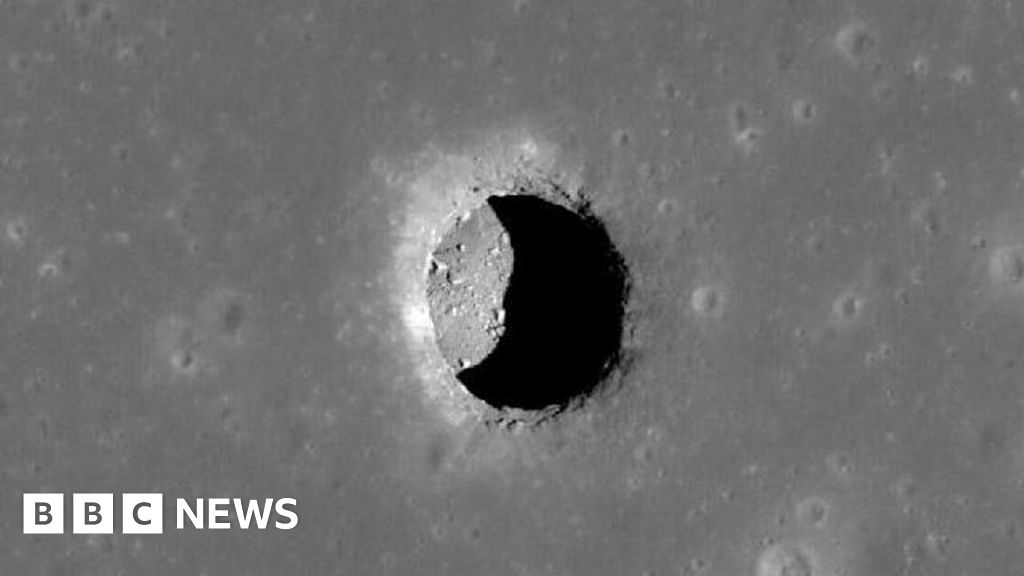- cross-posted to:
- futurology@futurology.today
- space@lemmy.world
- cross-posted to:
- futurology@futurology.today
- space@lemmy.world
Scientists have for the first time discovered a cave on the Moon.
At least 100m deep, it could be an ideal place for humans to build a permanent base, they say.
It is just one in probably hundreds of caves hidden in an “underground, undiscovered world”, according to the researchers.
Countries are racing to establish a permanent human presence on the Moon, but they will need to protect astronauts from radiation, extreme temperatures, and space weather.
Helen Sharman, the first British astronaut to travel to space, told BBC News that the newly-discovered cave looked like a good place for a base, and suggested humans could potentially be living in lunar pits in 20-30 years.



More, shelter.
There’s no atmosphere to attenuate hard radiation, so rock overhead is the next best thing.
There’s no gravity to contain an atmosphere, and domes are expensive and time consuming to build. Meanwhile the crews are exposed to radiation.
There’s nothing but regolith on the surface of the moon-- finely powdered rock of unknown (and likely poor) assay for vital ores and minerals useful to bootstrap a colony.
A cave provides shelter, more assay-ably dense ore resources, potentially water in the form of subsurface ice, and potentially a vitrable (melted, glassified rock) cavity to contain a viable, pressurized atmosphere on the quick.
A cave on the moon is a find. Given the potential for neocolonialism in the next decade or three, it’s a boon for whatever program discovers one.
edit: typos
The space is a harsh mistress, but also I’m pretty sure all the brochures will have at least one window from where earth is visible.
Even the ones on the far side.
Also architecturally impossible, since there’s nothing to stop them from flying upwards. Pressure vessels work best when rounded on every side.
Edit: Unless you count a half-buried sphere as a dome.
There’s more of these known BTW. The new thing is just proof that the hole continues underneath like expected.
That’s just not true, there’s exposed rocky outcrops as well.
You can get a long way with just the rock-building elements of silicon, iron, aluminum and magnesium, metals-wise (and maybe calcium with no air to bother you). Volatiles are the real prize everyone is after.
We already have neocolonialism on earth.
I don’t see how the economics of space mining is supposed to work out. We have tons of ore on earth, in existing mines, just sitting there, because it’s more expensive to expand the mine/process less pure ores than the result is worth. It’s not like there’s asteroids of pure platinum floating around.
Lemma: Earth lodes are assumed to be limited supply.
Find a Smaug-scale lode of d-block transition metal like gold or palladium on the Moon or a near-Earth asteroid. Crash the market. Buy other metals at fire sale prices.
Also, own the silicon semiconductor market.
Profit.
We did neocolonialism. It was profitable. Nobody forgot that.
Do we have any reason to believe there’s giant blocks of pure, rare metals on the moon or asteroids? At least on earth we (well mostly China) gets them by processing more common metals and extracting the tiny portion of REs.
*are doing, is profitable
There’s no brown people on the moon you can give a dictator weapons to in exchange for keeping the people selling their labor and resources for peanuts.
OK fine, we are mid-neocolonial. Accepted.
So far there’s no evidence to the contrary. Speculative interest says “keep digging, there’s bound to be one out there” among the rocky asteroids. Heck, even “comet water might” bring a price, given trends.
If you think the next wave of neocolonialism wouldn’t consider indentured servitude and/or conscription, well… I guess we shall see. You don’t need indigenous people, just poors.
Edit: …when you can just turn off their air.
I don’t tend to look at the moon for mining itself, more as the port from which we can more cheaply and easily head to the asteroid belt where the money is.
Launching stuff off of earth in order to build large structures/ships in orbit is expensive as hell because of the gravity well. Get moon manufacturing off the ground, then everything we build and everywhere we go from there becomes infinitely cheaper (including Mars).
The Moon gives us the solar system. Far more than going direct to Mars ever would.
Not to mention that all the fancy technologies like mass drivers and skyhooks and space elevators are a lot easier to do on the moon.